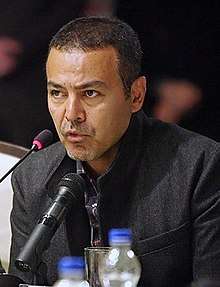Fariborz Arabnia
Fariborz Arabnia (Persian: فریبرز عربنیا) (born 28 April 1964 in Tehran) is an Iranian actor, philanthropist[1] and director.
Fariborz Arabnia | |
|---|---|
 Arabnia in 2013 | |
| Born | Fariborz Arabnia April 28, 1964 |
| Nationality | Iran |
| Alma mater | Middle East Technical University |
| Occupation | Actor, Film Director |
| Years active | 1990–present |
Notable work | Sultan, Shokaran, Mokhtarnameh |
| Spouse(s) | Ateneh Nasiri (1991–1999) Asal Badiee (2000–2004) |
| Children | Johnyar (b. 2002) |
| Relatives | Hassan Arabnia (Father) Eftekhar Sedaghattalab (Mother) Faramarz Arabnia (Brother) Fariba Arabnia (sister) Farnaz Arabnia (sister) |
Early life
Fariborz Arabnia was born on 14 April 1964 in Tehranpars, Tehran. After completing military service, Arabnia was moved to Turkey to study at the Middle East Technical University at the Managing. He left Turkey in 1988 and returns to Iran. His father, Hassan (1929–2009) and his mother, Eftekhar (born 1936) were married in 1959. He has one elder brother, Faramarz (born 1966).
Career
Acting
He experimented Theater at the Tehran's Thater Center. He directed many shows from 1988 to 1990, for example, Avazekhan-e Tas, Kaligola, and Dayere Ghachi Ghafghazi. He started his career in cinema in 1990 at Wild Deer. He appeared in eight movies in second and third roles but when he was invited by Masoud Kimiai to play at his film, Feast, makes him one of the best actors at that time. His acting was one of the bests in Fajr Film Festival for 1995. His top performance was at Sultan, he reached the bottom of the icon, a hero to all of the most beautiful plays. This portrayal was so good, and acceptable monthly film critics called his best game of the Fajr Film Festival XV. Meanwhile, Arabnia was not even nominated for an award. He was the best actor of Iranian cinema in late 1990s and 2000s. He spent more than five years for playing in Mokhtarnameh, a film that he ruled Al-Mukhtar's icon. This film was selected as one of the best plays of Arabnia by Iranian and Arabs film experts.
Directing
He started his directing career in 2012. His first film is named Ambulance. Most of sequences are in Tehran.
Filmography
- Wild Deer (1990)
- Contact Good (1991)
- Mosaferan (1991)
- Eclipse (1992)
- I love the Earth (1993)
- The 5th man (1994)
- Kakadow (1995)
- Restlessness years (1995)
- Scent of Life (1995)
- Deadly Escape (1995)
- The Feast (1996)
- Sultan (1996)
- Higher risk (1997)
- Artery (1997)
- World Champion, Takhti (1998)
- Totiaa (1998)
- Shokaran (1998)
- Win Dawn (1999)
- Delbakhteh (2000)
- Bitter Almonds (2000)
- Hafth-Pardeh (2000)
- Thousands of Women like Me (2000)
- Gaga (2000)
- The colors of Night (2001)
- Atash (2003)
- Lead stars (2003)
- A Girl in a Cage (2004)
- Butterfly in the Wind (2004)
- Bargaining (2004)
- Bajkhor (2004)
- Free Peacock Feathers (2008)
- Empty Seats (2008)
- Hot chocolate (2010)
- Earth and fire (2011)
- Secret (2011)
- Blood Oranges (2011)
- Che (2013)
- Gaahi [Sometimes] (2015)
- When did You See Sahar Last Time? (2015)
TV series
- Vakil (1996–97)
- Mokhtarnameh (2004–08)
Controversy
He criticized Iranian cinema and television in a live program Haft (Seven) that was not supported by film directors, actors and actress.[2] As well, when he found differences with Ebrahim Hatamikia, he left and refuse to continue in his film, Ch that forced Hatamikia to use an lieu for his rule.[3]
Personal life
He had married twice, first with Ateneh Faghih Nasiri, an Iranian cinema actress in 1991 but they separated after eight years. After one year, he married with another Iranian actress, Asal Badiee. Their son, Johnyar was born in 2002 but the couple separated in 2004. Johnyar currently lives with Arabnia, after the death of his mother in April 2013.
See also
- Iranian cinema